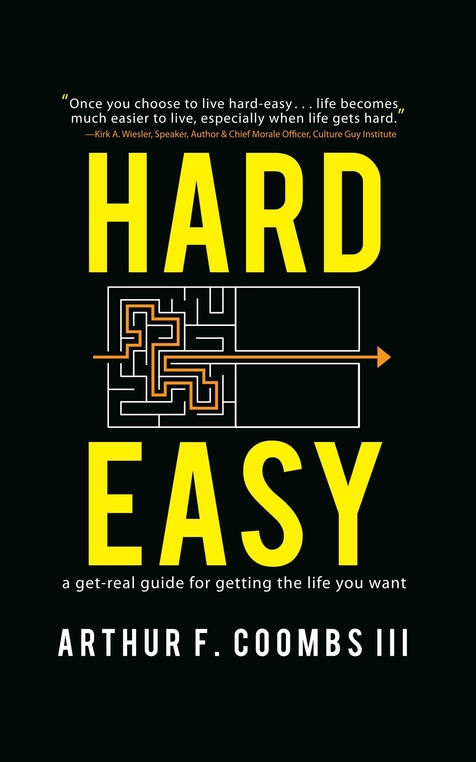Author Arthur F. Coombs III explicates his lifelong philosophy of behavior and personal choice in Hard-Easy: A Get-Real Guide for Getting the Life You Want, a helpfully straightforward manual for self-improvement.
The title of the book is also its philosophical structure: the idea that there are two modes of behavior – Hard-Easy and Easy-Hard. The former basically means doing the hard work first, and easily reaping the rewards later, while the latter means making the easy choice, and leaving the hard part for later. While this may seem like a rather simple premise for an entire book, Coombs has made it the guiding principle of his life, and meticulously explains how to apply it in your own life over the course of 300 frequently amusing pages.
Determining purpose, overcoming deeply seated demons, and rewiring the brain away from easy excuses are not easy tasks, but this book tackles such existential dilemmas one at a time. The questions and lesson summaries included at the end of each chapter, as well as the lists and more interactive portions, make reading this book an engaging activity – one that forces readers to focus on themselves, persuasively urging readers to begin applying the suggested strategies. By breaking down every choice into a binary of hard-easy vs. easy-hard, the book can be an effective tool for improvement.
In terms of presenting an argument for a wiser way to live, the concept of living hard-easy is quite compelling, and Coombs makes a strong argument, patiently moving through his ideas, which stack and build, fitting together in creative and eye-opening ways. Coombs proves that he is not just a sage writer, but an excellent storyteller, linking his larger points to meaning-steeped tales from his and others’ real-world experiences. He doesn’t need an entire book to explain the basic idea, but instead explores how hard-easy choices affect every corner of our lives, from relationships and career stagnation to decision-making and goal-setting.
The author’s philosophy is not only simple and straightforward, but its explanation is perpetually authentic. The tone of the majority of the writing is playful and funny, like a conversation with an old friend giving advice after knowing you for decades. Coombs also doesn’t claim to be the end-all, be-all expert on such subjects. He merely presents his perspective and encourages others to do the same, backing up his claims with strong anecdotal evidence. He is confident without seeming pretentious, proudly detailing his own journey of knowledge-spreading and inspiration.
In terms of structure and flow, the book is brilliantly ordered. The presentation of major ideas and big points is done well, with the chapter wrap-ups adding clarity and stability to the toolkit being suggested, though certain sections are stronger than others. Some of the storytelling drags on a bit long, and while this book can be considered part memoir and part self-help, there is room for some shortening of both areas. There is an academic detachment to some of the language, which lends authority, but this seamlessly blends with passages that display Coombs’ mischievous personality, which seems to imbue every page.
Overall, for anyone seeking a clear-cut, entertaining, and relatable approach to self-improvement, Hard-Easy will not disappoint.
Book Links
STAR RATING
Design
Content
Editing
Get an Editorial Review | Get Amazon Sales & Reviews | Get Edited | Get Beta Readers | Enter the SPR Book Awards | Other Marketing Services
























Leave A Comment